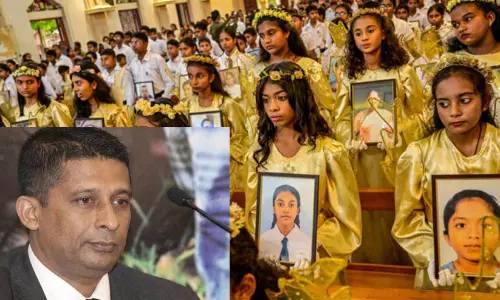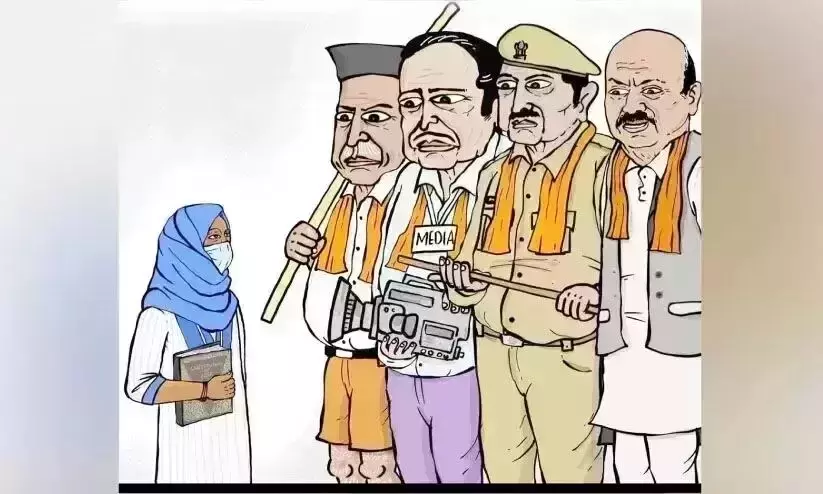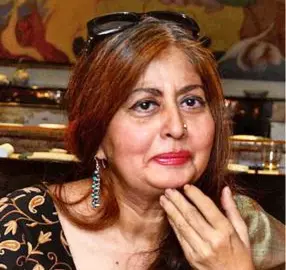
What I wear is my choice
text_fieldsCredit: Mir Suhail
I recall as a child I used to see my grandmother's women friends visiting the family, covering their heads with the sari - pallu. In fact, even to this day don't Sikh and Rajput and Jat and even Brahmin women cover their heads in the conventional and traditional settings! And they come across as so very graceful and dignified.
Why this all-out war on the burqa, hijab and the veil! After all, what is a hijab? Nothing but covering the head and the hair in a graceful traditional way, so that there's less of exposure and more of modesty and coverage. In fact, we were all in a 'hijab' of sorts the last two years –covering ourselves so very totally and thoroughly because of the Dengue mosquito scare and also of the corona virus infection scare! So why this sudden hue and cry as though covering the head or hair or the combination of the two is something unthinkable or baffling or medieval!
What I wear or don't wear is my business. Maybe I want to cover every inch of my body with the burqa and hijab. And why shouldn't I! It is my personal choice.
Why this sudden attack on the hijab and burqa! As a woman this is my basic right - what I decide to wear or not wear. Don't tell me we have reached such dismal lows that the Right-wing rulers and the mafia under their direct control will force their dos and don'ts on me! If I don't follow their dictates, I will be hounded from the educational institutions and harassed and ridiculed on the streets and lanes and by lanes of my country, with the administration and the police machinery standing as mute spectators, if not as collaborators!
Today, with the anti-Muslim propaganda accelerating, communal moves by the Right-wing forces are on the rise. Finding every possible excuse or an alibi to attack the 'other'. Trying their utmost to dent the very identity of the minority community, trying to heap negativity on that identity.
True, Islam insists that a woman ought to be dressed modestly and decently, but that doesn't mean there's some barbaric dress code! My maternal grandmother, Amna Rahman, loved to wear saris, with well-designed blouses and all seemed fine. No, there were no snide comments thrown her way from within or outside the community.
I have always dressed in accordance with what I want to wear or not wear. Though I'm comfortable with saris and blouses of all hues and shapes, I must detail this incident: one late night, whilst driving on the Delhi- Gurgaon highway, I faced a somewhat unnerving situation. What, with truckers honking, passing lewd comments, trying to overtake …when I couldn't take the strain, I got this bright idea — that evening I'd bought a dining table cover; pulling it out from the packet, throwing it on myself , covering my arms and hair… I took refuge in that piece of cloth. And it did cover me up so very completely. That bandobast worked! The remaining part of the long drive on the highway was hassle free!
Earlier, the very burqa was considered to be not just a sign of femininity but also that of grace. Remember, Bollywood films of the 50s and 60s where actresses with burqas on, drew the attention of not just the hero but also of us, the viewers.
When I had asked Khushwant Singh what drew him to his first lady love, Hyderabad-based Ghayoorunissa, he listed the burqa as one of the attractions. To quote him, "I must have been around 17 years and Ghayoorunissa was three years older than me. She was my sister's friend …on one of those occasions when she and I and my sister had gone to see cinema , she'd slipped her hand on mine and held my hand … and that alone meant a lot to me. I was drawn to her and that burqa she'd worn added to that entire atmosphere, to that romance, to her beauty."
And to all those who seem obsessively desperate to paint Islam and its followers in those dark shades, I want to stress on the fact that Islam is a much misunderstood religion in today's world scenario where Islamophobia holds sway, rather is made to hold sway by the Right-wing political lobbies and brigades at work, to cause anarchy cum havoc cum disruption on all possible fronts.
Far from being portrayed as a barbaric religion, if only one were to go by the sayings of the Prophet, the essence would hold out. Recently I re- read, 'The Sayings of Muhammad'. Compiled by Sir Abdullah Suhrawardy, with the foreword written by Mahatma Gandhi, this book was published early last century. And each one of the Prophet's sayings stresses on compassion and human values.
Also, there's much focus on the dignity and respect that ought to be given to women. To quote Bertram Thomas, " He (Prophet Muhammad ) never ceased to champion the cause of women against the ill-treatment of his contemporaries. He condemned the practice of inheriting the widow with the rest of of an estate as though she were a chattel. She must not be a despised creature to be ashamed of and to be ill- treated anymore, but a person to love and cherish and respect: at her feet lay the gates of paradise."
Here are some of Prophet Muhammad's sayings:
"Women are the twin-halves of men."
"Whoever doeth good to girls, it will be a curtain to him from hell-fire."
" Whoever hath a daughter, and doth not bury her alive, or scold her, or prefer his male children to her, may God bring him into Paradise." (This refers to the then prevalent practice of female infanticide which Prophet Muhammad abolished).
"God enjoins you to treat women well, for they are your mothers, daughters and aunts."
"The rights of women are sacred. See the women are maintained in the rights assigned by them."
"Do not prevent your women from coming to the mosque."























